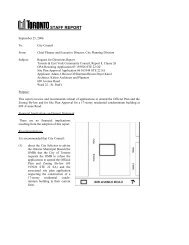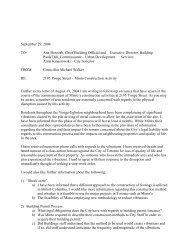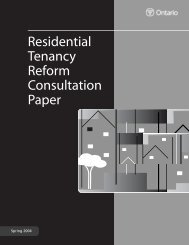Residential Tenancies Act: Briefing Book - Michael Walker
Residential Tenancies Act: Briefing Book - Michael Walker
Residential Tenancies Act: Briefing Book - Michael Walker
You also want an ePaper? Increase the reach of your titles
YUMPU automatically turns print PDFs into web optimized ePapers that Google loves.
<strong>Residential</strong> <strong>Tenancies</strong> <strong>Act</strong>, 2007<br />
B R I E F I N G B O O K<br />
Overview of the <strong>Residential</strong> <strong>Tenancies</strong> <strong>Act</strong><br />
The eviction process<br />
The eviction process involves different steps, forms and deadlines depending on the<br />
reason for the eviction. Tenants may move out or make remedy to avert eviction (except<br />
in situations such as illegal acts and impaired safety) at any stage. For those reasons for<br />
termination that do not have a remedy – most are the "no fault" reasons – the application<br />
will go to a hearing where the tenant can dispute the reasons for eviction.<br />
Generally the process involves a number of steps in the following sequence:<br />
� Notice of Termination – The landlord must give the tenant a notice in writing<br />
when they want a tenant to move out, regardless of the reason. This is called<br />
notice of termination. The notice must specify the termination date.<br />
� Application to the Landlord and Tenant Board (the Board) – If the tenant does not<br />
remedy the situation (e.g. pay rent before the termination date), the landlord may<br />
apply to the Landlord and Tenant Board to evict the tenant and/or collect the rent<br />
owed. Once the application is received, the Board schedules a hearing and gives<br />
the landlord a Notice of Hearing. The landlord is required to give the tenant a<br />
copy of the application and the Notice of Hearing.<br />
o Every tenant who faces an eviction application will automatically have<br />
access to a hearing or mediation. This is a change from the TPA which<br />
required the tenant to file a written dispute in order to have a hearing.<br />
� Hearing before the Board – At the hearing, the adjudicator hears evidence and<br />
arguments on both sides and decides whether or not to make an order on the<br />
application. For example, if the application is about eviction due to non-payment<br />
of rent, the adjudicator may decide whether to order the tenant to pay the rents<br />
owed or to evict the tenant.<br />
o Sometimes, the tenant and the landlord can reach an agreement on a<br />
payment plan and file a copy of the written agreement with the Board. In<br />
this case, the Board will issue a consent order based on the agreed<br />
payment plan and a hearing will not be required.<br />
o In a hearing about arrears or eviction due to non-payment of rent, the<br />
tenant can raise other issues such as maintenance or harassment as long as<br />
they can provide supporting evidence, and the adjudicator may order<br />
remedies on the tenant’s claim.<br />
� Order to terminate tenancy – After the hearing, the adjudicator makes a decision<br />
and issues an order that will be sent to both parties by mail. The order indicates<br />
the reason for the order and the effective date after which the landlord can enforce<br />
the order.<br />
17






